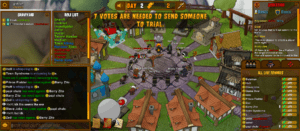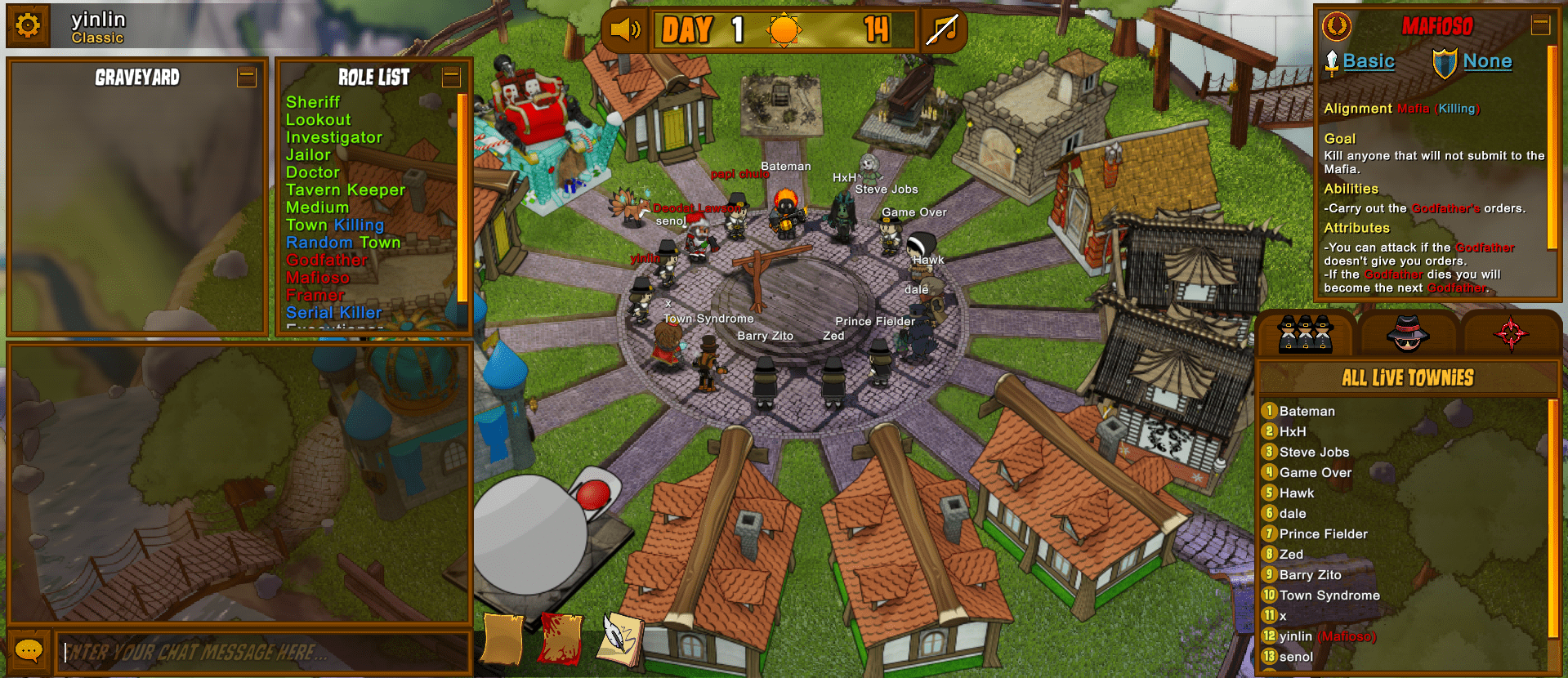Town of Salem is an online browser game by BlankMediaGames. It is based on Mafia-style games, but instead of being a simple in-person party game, it takes place online, in a multiplayer space with strangers, with a more complex role system. It is intended for players teen and up, especially people who enjoy hidden-role games and are comfortable with the mildly edgy and sometimes abrasive culture of Town of Salem’s user base, since people will sometimes say inappropriate things in the chat.

I chose this game because, while not a fill-in-the-blank game like Quiplash or Cards Against Humanity, I felt it had aspects of a deception/hidden role game that would provide interesting insight on trying to work as a team in a subset of a larger group. Our game prototype, which I will call Kings and Queens in this comparison, combines aspects of games like Quiplash, and We’re Not Really Strangers, but with an added deception mechanic that informed my decision to play Town of Salem for my critical play.
In Kings and Queens, players are assigned roles that determine how they play the game: King, Queen, and regular player. The Queen and regular players write responses to a prompt and the King tries to select the prompt that they believe is written by the Queen, while other players try to prevent that. This is the game mechanic that I find has the most similarity with Town of Salem, since both games involve players in a subset team trying to cooperate through communication while trying to avoid being detected or obstructed by the larger group. The type of fun that can be derived from this is a kind of fellowship between members of the smaller team, especially as they must work towards a goal that is different from that of the larger team and therefore share common aims and secrets. In Kings and Queens, this fellowship is experienced between the small pair of the King and Queen players, and between the regular players who are trying to obstruct the King and Queen. Since the prompts in this game are much more personal, a social environment is created through the process of writing and reacting to everyone’s prompt responses, which can be revealing of personal details or simply funny. In Town of Salem, I experienced more fellowship when I played as a mafia member, since there were only three of us trying to escape notice from the townspeople.
The main difference between Town of Salem and Kings and Queens is the platform that each game is hosted on. Town of Salem, as a fully online game, is able to accommodate a much more complex role system than Kings and Queens, since players can take actions simultaneously and the moderator is a computer and not a person. Every villager and mafia player each have an individual role, such as medium (can speak to the dead) and framer (can frame other people to appear to be mafia members). Unlike traditional mafia or Kings and Queens, this made the experience of being a townsfolk / regular player much more engaging, since I was able to take on a more active role in the game. Being empowered to do a certain action meant I felt more significant, and could bring unique information to discussions, when in other games I would often feel I had nothing to add if I didn’t have a particular role.
However, the online aspect of Town of Salem makes the game much less social than Kings and Queens or in-person mafia. The online matching system means you play mainly with strangers, and that pool of strangers completely changes in between matches. This means there are not a lot of chances for repeated serendipitous interactions: aside from speaking infrequently in waiting rooms, the only other time people interact is during gameplay, when people tend to be much more suspicious of each other. Not only that, but the limited time for discussion and voting each day means that people would much rather spend that time discussing clues rather than participating in more low-stakes socializing. Being online with strangers also enables people to refuse to engage with social interactions completely by just leaving the game, which has diminished the fun I found in fellowship with my teammates. For example, when I played as mafia one round, one of the other mafia members disconnected from the game immediately. Kings and Queens, and other in-person games create an environment that encourages participation and camaraderie more, since instead of being distanced from other players through a screen and anonymity, players are able to see each other face to face. Even if two players do not necessarily speak to one another, they can observe each other’s reactions and body language.


Removing anonymity also makes it more difficult to say rude things to each other, a problem that plagues Town of Salem servers. However, it can also hinder positive interactions by making players too reticent to engage in more risky, but rewarding interactions with one another, especially when the social dynamic in a group is already unbalanced. During playtesting Kings and Queens, for example, one of the players informed us that he felt too weird and awkward to really write anything in his responses, since he didn’t know the other players in the group as well as they knew each other.
Ultimately, I believe that in-person play is much more conducive to facilitating positive social environments and friendships. However, it is still worth weighing the effect of some of the mechanics that Town of Salem contains, especially since those mechanics excel in the places where Kings and Queens lags behind in: making a more competitive environment, and letting players be more comfortable participating.



